研究生英语课程unit6
- 格式:doc
- 大小:55.50 KB
- 文档页数:5
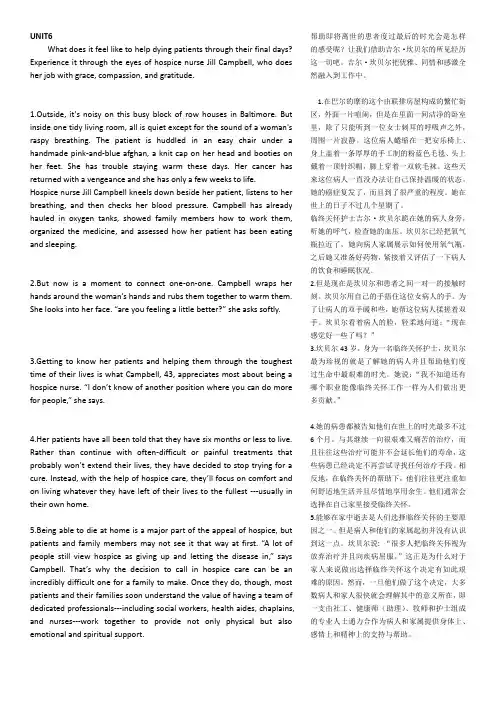
UNIT6What does it feel like to help dying patients through their final days? Experience it through the eyes of hospice nurse Jill Campbell, who does her job with grace, compassion, and gratitude.1.Outside, it's noisy on this busy block of row houses in Baltimore. But inside one tidy living room, all is quiet except for the sound of a woman's raspy breathing. The patient is huddled in an easy chair under a handmade pink-and-blue afghan, a knit cap on her head and booties on her feet. She has trouble staying warm these days. Her cancer has returned with a vengeance and she has only a few weeks to life. Hospice nurse Jill Campbell kneels down beside her patient, listens to her breathing, and then checks her blood pressure. Campbell has already hauled in oxygen tanks, showed family members how to work them, organized the medicine, and assessed how her patient has been eating and sleeping.2.But now is a moment to connect one-on-one. Campbell wraps her hands aro und the woman’s hands and rubs them together to warm them. She looks into her face. “are you feeling a little better?” she asks softly.3.Getting to know her patients and helping them through the toughest time of their lives is what Campbell, 43, appreciates most about being a hospice nurse. “I don’t know of another position where you can do more for people,” she says.4.Her patients have all been told that they have six months or less to live. Rather than continue with often-difficult or painful treatments that probably won’t extend their lives, they have decided to stop trying for a cure. Instead, with the help of hospice care, they’ll focus on comfort and on living whatever they have left of their lives to the fullest ---usually in their own home.5.Being able to die at home is a major part of the appeal of hospice, but patients and family members may not see it that way at first. “A lot of people still view hospice as giving up and letting the disease in,” says Campbell. That’s why the decision to c all in hospice care can be an incredibly difficult one for a family to make. Once they do, though, most patients and their families soon understand the value of having a team of dedicated professionals---including social workers, health aides, chaplains, and nurses---work together to provide not only physical but also emotional and spiritual support. 帮助即将离世的患者度过最后的时光会是怎样的感受呢?让我们借助吉尔·坎贝尔的所见经历这一切吧。

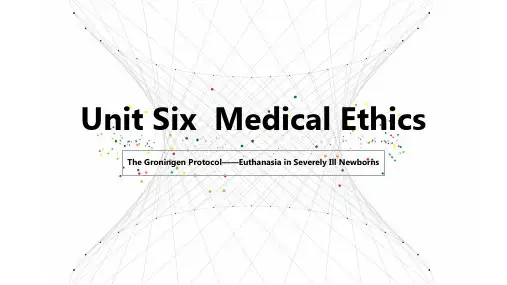


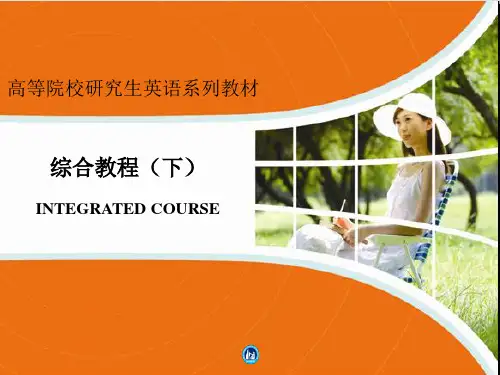

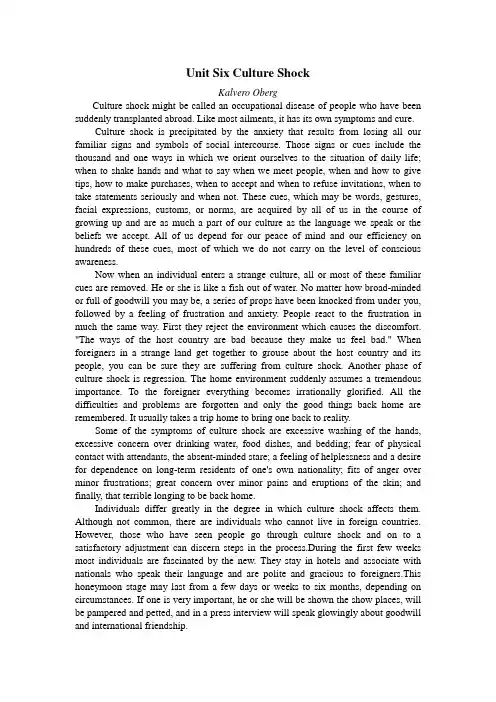
Unit Six Culture ShockKalvero ObergCulture shock might be called an occupational disease of people who have been suddenly transplanted abroad. Like most ailments, it has its own symptoms and cure.Culture shock is precipitated by the anxiety that results from losing all our familiar signs and symbols of social intercourse. Those signs or cues include the thousand and one ways in which we orient ourselves to the situation of daily life; when to shake hands and what to say when we meet people, when and how to give tips, how to make purchases, when to accept and when to refuse invitations, when to take statements seriously and when not. These cues, which may be words, gestures, facial expressions, customs, or norms, are acquired by all of us in the course of growing up and are as much a part of our culture as the language we speak or the beliefs we accept. All of us depend for our peace of mind and our efficiency on hundreds of these cues, most of which we do not carry on the level of conscious awareness.Now when an individual enters a strange culture, all or most of these familiar cues are removed. He or she is like a fish out of water. No matter how broad-minded or full of goodwill you may be, a series of props have been knocked from under you, followed by a feeling of frustration and anxiety. People react to the frustration in much the same way. First they reject the environment which causes the discomfort. "The ways of the host country are bad because they make us feel bad." When foreigners in a strange land get together to grouse about the host country and its people, you can be sure they are suffering from culture shock. Another phase of culture shock is regression. The home environment suddenly assumes a tremendous importance. To the foreigner everything becomes irrationally glorified. All the difficulties and problems are forgotten and only the good things back home are remembered. It usually takes a trip home to bring one back to reality.Some of the symptoms of culture shock are excessive washing of the hands, excessive concern over drinking water, food dishes, and bedding; fear of physical contact with attendants, the absent-minded stare; a feeling of helplessness and a desire for dependence on long-term residents of one's own nationality; fits of anger over minor frustrations; great concern over minor pains and eruptions of the skin; and finally, that terrible longing to be back home.Individuals differ greatly in the degree in which culture shock affects them. Although not common, there are individuals who cannot live in foreign countries. However, those who have seen people go through culture shock and on to a satisfactory adjustment can discern steps in the process.During the first few weeks most individuals are fascinated by the new. They stay in hotels and associate with nationals who speak their language and are polite and gracious to foreigners.This honeymoon stage may last from a few days or weeks to six months, depending on circumstances. If one is very important, he or she will be shown the show places, will be pampered and petted, and in a press interview will speak glowingly about goodwill and international friendship.But this mentality does not normally last if the foreign visitor remains abroad and has seriously to cope with real conditions of life. It is then that the second stage begins, characterized by a hostile and aggressive attitude toward the host country. This hostility evidently grows out of the genuine difficulty which the visitor experiences in the process of adjustment. There are house troubles, transportation troubles, shopping troubles, and the fact that people in the host country are largely indifferent to all these troubles. They help, but they don't understand your great concern over these difficulties. Therefore, they must be insensitive and unsympathetic to you and your worries. The result, “I just don't like them.” You become aggressive, you band together with others from your country and criticize the host country, its ways, and its people. But this criticism is not an objective appraisal. Instead of trying to account for the conditions and the historical circumstances which have created them, you talk as if the difficulties you experience are more or less created by the people of the host country for your special discomfort.You take refuge in the colony of others from your country which often becomes the fountainhead of emotionally charged labels known as stereotypes. This is a peculiar kind of offensive shorthand which caricatures the host country and its people in a negative manner. The "dollar grasping American" and the "indolent Latin Americans“are samples of mild forms of stereotypes. The second stage of culture shock is in a sense a crisis in the disease. If you come out of it, you stay; if not, you leave before you reach the stage of a nervous breakdown.If visitors succeed in getting some knowledge of the language and begin to get around by themselves, they are beginning to open the way into the new cultural environment. Visitors still have difficulties but they take a "this is my problem and I have to bear it" attitude. Usually in this stage visitors take a superior attitude to people of the host country. Their sense of humor begins to exert itself. Instead of criticizing, they joke about the people and even crack jokes about their own difficulties. They are now on the way to recovery.In the fourth stage, your adjustment is about as complete as it can be. The visitor now accepts the customs of the country as just another way of living. You operate within the new surroundings without a feeling of anxiety, although there are moments of social strain. Only with a complete grasp of all the cues of social intercourse will this strain disappear. For a long time the individual will understand what the national is saying but is not always sure what the national means. With a complete adjustment you not only accept the food, drinks, habits, and customs, but actually begin to enjoy them. When you go home on leave, you may even take things back with you; and if you leave for good, you generally miss the country and the people to whom you became accustomed.。
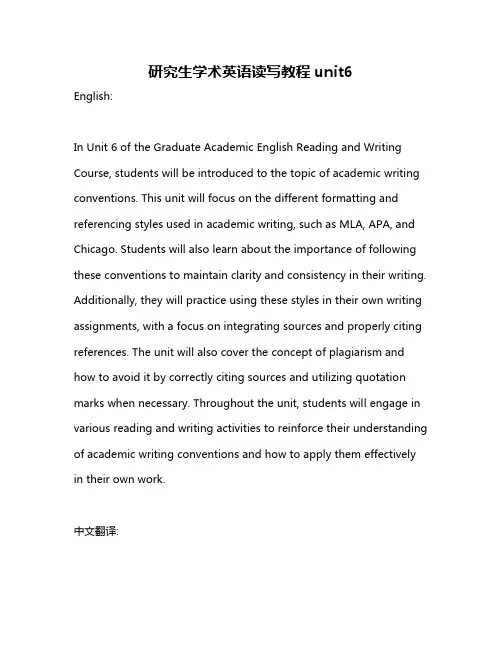
研究生学术英语读写教程unit6English:In Unit 6 of the Graduate Academic English Reading and Writing Course, students will be introduced to the topic of academic writing conventions. This unit will focus on the different formatting and referencing styles used in academic writing, such as MLA, APA, and Chicago. Students will also learn about the importance of following these conventions to maintain clarity and consistency in their writing. Additionally, they will practice using these styles in their own writing assignments, with a focus on integrating sources and properly citing references. The unit will also cover the concept of plagiarism and how to avoid it by correctly citing sources and utilizing quotation marks when necessary. Throughout the unit, students will engage in various reading and writing activities to reinforce their understanding of academic writing conventions and how to apply them effectively in their own work.中文翻译:在研究生学术英语读写教程的第六单元中,学生将被介绍学术写作的惯例。
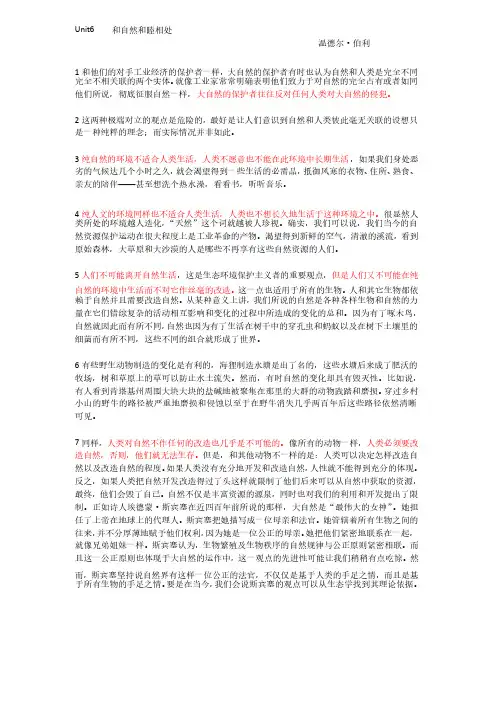
Unit6 和自然和睦相处温德尔·伯利1和他们的对手工业经济的保护者一样,大自然的保护者有时也认为自然和人类是完全不同完全不相关联的两个实体。
就像工业家常常明确表明他们致力于对自然的完全占有或者如同他们所说,彻底征服自然一样,他们所说,彻底征服自然一样,大自然的保护者往往反对任何人类对大自然的侵犯。
大自然的保护者往往反对任何人类对大自然的侵犯。
2这两种极端对立的观点是危险的,最好是让人们意识到自然和人类彼此毫无关联的设想只是一种纯粹的理念;而实际情况并非如此。
3纯自然的环境不适合人类生活,人类不愿意也不能在此环境中长期生活,如果我们身处恶劣的气候达几个小时之久,就会渴望得到一些生活的必需品,抵御风寒的衣物、住所、熟食、亲友的陪伴——甚至想洗个热水澡,看看书,听听音乐。
4纯人文的环境同样也不适合人类生活,人类也不想长久地生活于这种环境之中。
很显然人类所处的环境越人造化,“天然”这个词就越被人珍视。
确实,我们可以说,我们当今的自然资源保护运动在很大程度上是工业革命的产物。
然资源保护运动在很大程度上是工业革命的产物。
渴望得到新鲜的空气,渴望得到新鲜的空气,渴望得到新鲜的空气,清澈的溪流,清澈的溪流,看到原始森林,大草原和大沙漠的人是哪些不再享有这些自然资源的人们。
5人们不可能离开自然生活,这是生态环境保护主义者的重要观点,,这是生态环境保护主义者的重要观点,但是人们又不可能在纯但是人们又不可能在纯自然的环境中生活而不对它作丝毫的改造。
这一点也适用于所有的生物。
人和其它生物都依赖于自然并且需要改造自然。
从某种意义上讲,我们所说的自然是各种各样生物和自然的力量在它们错综复杂的活动相互影响和变化的过程中所造成的变化的总和。
因为有了啄木鸟,自然就因此而有所不同,自然也因为有了生活在树干中的穿孔虫和蚂蚁以及在树下土壤里的细菌而有所不同,这些不同的组合就形成了世界。
6有些野生动物制造的变化是有利的,海狸制造水塘是出了名的,这些水塘后来成了肥沃的牧场,树和草原上的草可以防止水土流失。
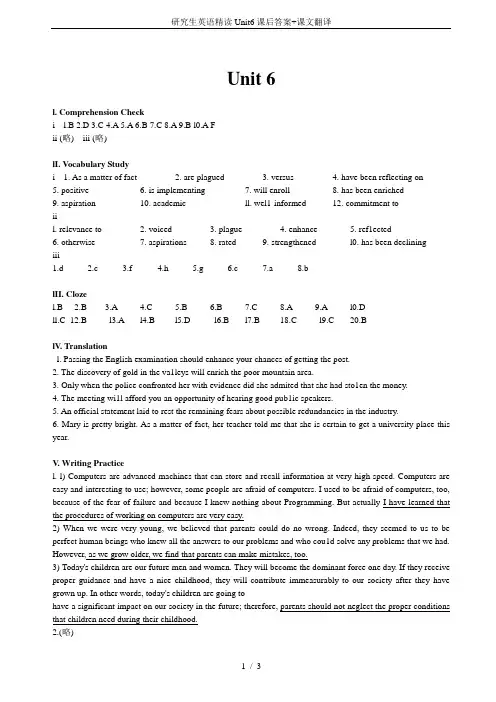
Unit 6l. Comprehension Checki l.B 2.D 3.C 4.A 5.A 6.B 7.C 8.A 9.B l0.A Fii (略) iii (略)lI. Vocabulary Studyi 1. As a matter of fact 2. are plagued 3. versus 4. have been reflecting on5. positive6. is implementing7. will enroll8. has been enriched9. aspiration 10. academic ll. wel1-informed 12. commitment toiil. relevance to 2. voiced 3. plague 4. enhance 5. ref1ected6. otherwise7. aspirations8. rated9. strengthened l0. has been decliningiii1.d2.c3.f4.h5.g6.c7.a8.blII. Clozel.B 2.B 3.A 4.C 5.B 6.B 7.C 8.A 9.A l0.Dll.C 12.B l3.A l4.B l5.D l6.B l7.B 18.C l9.C 20.BlV. Translationl. Passing the English examination should enhance your chances of getting the post.2. The discovery of gold in the va1leys will enrich the poor mountain area.3. Only when the police confronted her with evidence did she admited that she had sto1en the money.4. The meeting wi1l afford you an opportunity of hearing good pub1ic speakers.5. An official statement laid to rest the remaining fears about possible redundancies in the industry.6. Mary is pretty bright. As a matter of fact, her teacher told me that she is certain to get a university place this year.V. Writing Practicel. l) Computers are advanced machines that can store and recall information at very high speed. Computers are easy and interesting to use; however, some people are afraid of computers. I used to be afraid of computers, too, because of the fear of failure and because I knew nothing about Programming. But actually I have learned that the procedures of working on computers are very easy.2) When we were very young, we believed that parents could do no wrong. Indeed, they seemed to us to be perfect human beings who knew all the answers to our problems and who cou1d solve any problems that we had. However, as we grow older, we find that parents can make mistakes, too.3) Today's children are our future men and women. They will become the dominant force one day. If they receive proper guidance and have a nice childhood, they will contribute immeasurably to our society after they have grown up. In other words, today's children are going tohave a significant impact on our society in the future; therefore, parents should not neglect the proper conditions that children need during their childhood.2.(略)Key to supplementary readingA l.D 2.D 3.C 4.B 5.D 6.B 7.A 8.DB l.F 2.F 3.T 4.F 5.F 6.T 7.T 8.F 9.T l0.T参考译文社会服务经历时大学生的影响琳达J 萨克斯大学期间,参加社会服务的学生比不参加社会服务的学生更能提高自己的领导能力和社交方面的自信。
Unit 6Matriculation Fixation Vocabularylanguish garner (L. 7) rue (L.14) feignexude shudder dragoon •wear on•carve out•tick off•follow suit •poke fun at (L. 118) •fork over (L. 128)languishvi.be or become weak; lose strength or vigorTruth may languish, but can never perish. 真理可能衰微,但不会灭亡garnervt. to obtain as a result of effortShe garnered large profits from her unique invention.The issue of corruption in sport has garnered attention for a long time.ruevt. to feel regret, remorse, or sorrow forIndia's ruling Congress party will rue its decision to contest Parliamentary seats alone in eastern Bihar state.Eventually, even with significant changes, all of America will rue the day if the Senate passes this troublesome bill and it is voted into law.spawnn. a young animal or childv. cause or lead to 致使,导致The tyranny spawned widespread rebellion.feignvt. give a false appearanceAt that time he had no way out, but he had to feign madness and act like an idiot.那时他别无他法,只好装疯卖傻。
研究生英语核心教程—综合教材(下)Unit6 课文英汉对照Same Sex Marriage in the United States美国同性婚姻的合法性Matthew Brigham The proposed legalization of same-sex marriage is one of the most significant issues in contemporary American family law. Presently, it is one of the most vigorously advocated reforms discussed in law reviews, one of the most explosive political questions facing lawmakers, and one of the most provocative issues emerging before American courts. If same-sex marriage is legalized, it could be one of the most revolutionary policy decisions in the history of American family law. The potential consequences, positive or negative, for children, parents, same-sex couples, families, social structure, public health, and the status of women are enormous. Given the importance of the issue, the value of comprehensive debate of the reasons for and against legalizing same-sex marriage should be obvious. Marriage is much more than merely a commitment to love one another. Aside from societal and religious conventions, marriage entails legally imposed financial responsibility and legally authorized financial benefits. Marriage provides automatic legal protections for the spouse, including medical visitation, succession of a deceased spouse’s property, as well as pension and other rig hts. When two adults desire to “contract” in the eyes of the law, as well as perhaps promise in the eyes of the Lord and their friends and family, to be responsible for the obligations of marriage as well as to enjoy its benefits, should the law prohibit their request merely because they are of the same gender? I intend to prove that because of Article IV of the United States Constitution, there is no reason why the federal government nor any state government should restrict marriage to a predefined heterosexual relationship.“同性婚姻合法化”是当前美国家庭法律中最重大的议题之一,是美国在法律审查过程中最被人们极力倡导的改革之一,对立法者来说是最具爆炸性的政治问题之一,也是美国法院所面临的最具有争议性的焦点(问题)之一。
Unit 6Text AII. Language points1. What mysterious force drives us into the arms of one person, while pushing us away from another who might appear equally desirable to any unbiased observer? (para. 3) What mysterious power makes us attracted to that someone special even if the people whom we face might be all suitable if judged fairly.2. Of the many factors influencing our idea of the perfect mate, one of the most telling, according to John Money, professor emeritus of medical psychology and pediatrics at Johns Hopkins University, is what he calls our “love map” —a group of messages encoded in our brains that describes our likes and dislikes. (para.4) Many factors may influence our choice of a marriage partner. One of the most compelling factors is defined as “love map” by John Money who is professor emeritus of medical psychology and pediatrics at Johns Hopkins University, which is a group of messages indicating what we like and what we don’t like.3. It also records the kind of personality that appeal s to us, whether it’s the warm and friendly type or the strong, silent type.(para. 4) The “love map” also records the personality type which attracts us, whether it’s the warm and friendly type or the strong, silent type.4. When I lecture, I often ask couples in the audience what drew them to their dates or mates. (para. 6) When I deliver a lecture, I often ask couples what made them attracted to their lovers or marriage partners.5. The mother has an additional influence on her sons: she not only gives them clues to what they will find attractive in a mate, but also affects how they feel about women in general. (para.9) The son may not only choose a mate who is quite similar to his mother in characteristics, but also develop his feelings toward women in general.6. Conversely, a mother who has a depressive personality, and is sometimes friendly but then suddenly turns cold and rejecting, may raise a man who becomes a “dance-away lover.” (para. 10) On the contrary, if a mother is depressed in general, and sometimes friendly but then suddenly becomes cold and merciless, her son may become an unreliable lover.7. Because he’s been so scared about love from his mother, he is afraid of commitment54and may pull away from a girlfriend for this reason. (para.10) …d ue to this reason, he may be afraid of dating.8. While the mother determines in large part what qualities attract us in a mate, it’s the father — the first male in our lives — who influences how we relate to the opposite sex. (para.11) Whereas the mother determines to a large extent what qualities in a mate appeal to us, the father, who is the first male in our lives, influences how we get along with the opposite sex.9. We hang around with people in the same town; (para.13) We stroll around and stay with people in the same town;hang about/ (a) round be standing or loitering about, doing nothing definiteSince he lost his job, he’s been hanging about here. 他失业后一直在这里闲着。
10. We tend to be most comfortable with these people, and therefore we tend to link upwith others whose families are often much like our own. (para.13) We are inclined to be most comfortable with these people, and so we are inclined to marry people with similar family background.11. It’s rather like the old, but perceptive, saying on the subject of marriage that advisesfuture partners to make sure that the holes in one’s head fit the bumps in the other’s.(para.16) Looking for someone with complementary needs is just like the saying on the subject of marriage, old but to the point. It suggests that future marriage partners should fit each other.12. Or, as Winch observed, it’s the balancing out of sociological likenesses andpsychological differences that seems to point the way for the most solid lifelong romance. (para.16) Winch found that the trade-off between sociological similarities and psychological differences might be the way for a strongest romance for our whole life. 13. It turns out that the woman was like her mother-in-law —a loving and caringperson, the type who rolls up her sleeves and volunteers to work at church or help out people in need. (para.18) It is proved that his wife was like his mother, a loving and caring person who was willing to prepare for the work at church or help out people in need.14. This is the quality that her husband fell for, and it made color and religion and anyother social factors irrelevant to him.(para.18) This is the quality that her husband loved, and he ignored any other social factors, such as color and religion.fall for fall in love withThey met at a friend’s house and fell for each other immediately.15. …his marriage was his favorite gig, even though it was Gracie who got all the laughs.(para.19) … his marriage was his favorite recreation, even though Gracie, his wife, laughed more frequently.16. They complemented each other perfectly: he was the straight man, and she deliveredUnit 6 55the punch lines. (para.19) They were a perfect match because he was serious and honest while she was humorous and had many intelligent remarks.punch line the point of a joke or humorous storyHe is eloquent, and always delivers the punch lines.他口才很好,说出话来妙语连珠。